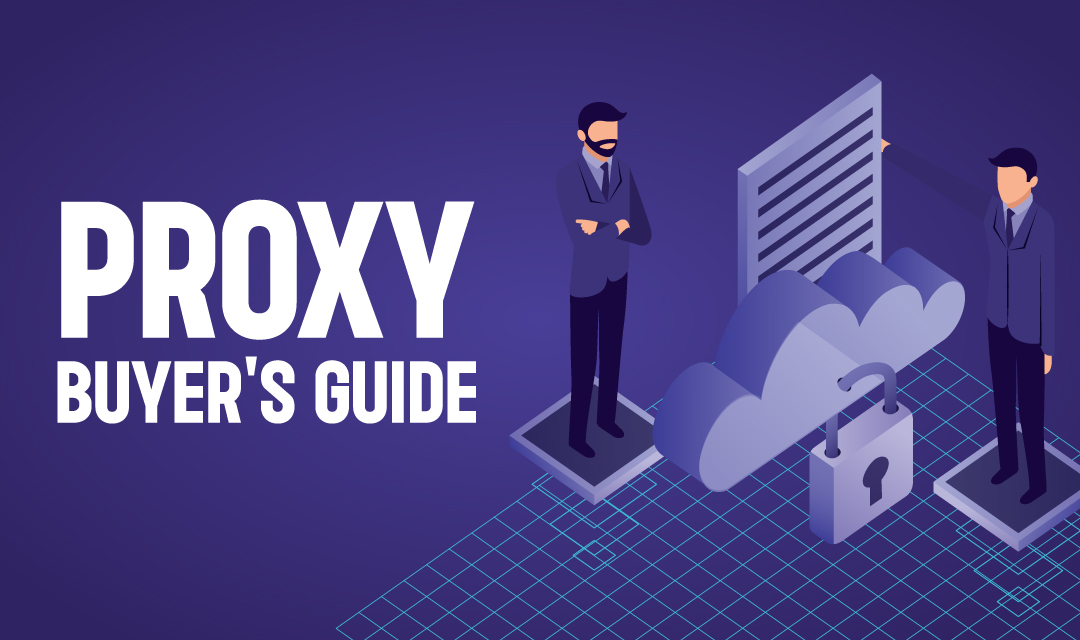
Proxy servers have become indispensable tools for individuals and businesses with various online activities. The proxy will help you enhance privacy and security, bypass geo-restrictions, and help you gather data from the Internet. However, with a plethora of proxy services available, choosing the right one can be a daunting task.
In this comprehensive Proxy Buyer's Guide, we'll demystify proxy servers and explore key factors to consider when selecting a proxy service. We'll also highlight popular proxy providers, offer tips for security and anonymity, and discuss legal and ethical considerations.
What is a proxy Server?
A proxy server acts as an intermediary between your device and the internet. It routes your online requests through its own IP address, concealing your true IP address in the process. There are several types of proxy servers, including HTTP proxies, HTTPS proxies, SOCKS proxies, residential proxies, datacenter proxies, and mobile proxies each with its unique use cases.
Proxy servers will help you enhance privacy, offer anonymity, and bypass geo-restrictions. They are also used for web scraping and data gathering and have become crucial tools in activities like sneaker copping.
How is proxy different from buying an IP address?
Buying an IP address and using a proxy server both provide intermediary internet connectivity and enhance anonymity and privacy online. You may choose an IP from a specific country much like how you choose a proxy server. However, they serve different functions and have distinct characteristics.
Buying an IP address will get you a static IP address from an ISP or a web host. The IP address acquired from the provider is assigned to your device and remains the same until you get a new IP address. You'll have to manage your own device and may use the device however you desire including as a proxy server.
Proxy service on the other hand will get you a dynamic IP address and will change each time you connect to a proxy server. A proxy is essentially routing your internet traffic through an intermediary server with its own IP address.
1. Commonalities
Buying an IP and using a proxy server have the following common features.
- You will be able to choose a particular geolocation (country, region, and city).
- By choosing a desired location, you will be able to prevent geoblocking or Internet censorship.
- You will be able to hide your IP address provided by your ISP.
- They can both be used for web scraping and competitor analysis.
2. Differences
Buying an IP and using a proxy server has the following differences.
- Buing an IP will get you a static IP while obtaining a proxy server will get you a dynamic IP.
- Proxy server will provide you with an IP rotation where you'll be able to rotate an IP whenever you desire.
- Proxy service can get you a residential, data center, ISP, or mobile IP address while purchased IP will be limited to a residential (if bought from an ISP), or a data center (if bought from a web host).
Factors to Consider When Choosing a Proxy Service
Selecting the right proxy service depends on your specific needs and budget. Consider the following factors:
- Purpose: Determine why you need a proxy. Is it for privacy, security, data collection, geoblocking, or any other purposes?
- Proxy Type: Choose the appropriate proxy type for your use case. Available proxy types include HTTP, HTTPS, or SOCKS proxies. Also, there are residential, data center, and mobile proxies.
- Proxy Location: Decide where you want your proxy IP addresses to be located. The location of the proxy can affect performance and reliability.
- Speed and Performance: Ensure that the proxy service offers adequate speed and performance for your intended purpose.
- Reliability and Uptime: Opt for a provider with a track record of high uptime and reliability.
- Compatibility with Applications: Verify that the proxy service is compatible with the applications you intend to use it with.
- Pricing and Subscription Plans: Review pricing options, and choose a plan that fits your budget and usage.
- Customer Support and User Reviews: Investigate the quality of customer support and read user reviews to gauge the provider's reputation.
- Data Retention and Privacy Policy: Understand the provider's data retention policies and privacy safeguards.
For more tips on finding the best proxy provider, please review 7 tips on choosing the best proxy provider article.
Best Proxy Service Providers
To help you get started, we've compiled a list of some of the best proxy service providers:
- Oxylabs: Known for best success rate.
- Decodo (formally Smartproxy): Known for its user-friendly interface and performance.
- ScraperAPI: Manages large-scale rotating proxies seamlessly within its web scraping API.
- Bright Data: Known for large number of IP addresses and coverages
Each of these providers has its own set of features, pricing plans, and strengths, so be sure to research them thoroughly to find the one that best suits your needs.
Tips for Proxy Security and Anonymity
While proxy servers can enhance your online security and anonymity, they require proper management to be effective. It's crucial to start with a reputable proxy provider that you can trust. Well-known providers are more likely to offer reliable services and prioritize user privacy. Avoid using free public proxies, as they often come with security risks and may not provide the anonymity and security you need.
Whenever possible, opt for HTTPS or SSL proxies. These proxies encrypt your data as it travels between your device and the proxy server, making it harder for third parties to intercept your online activities. Encryption adds a crucial layer of security to your proxy usage.
Transparent proxies reveal your original IP address to the destination server, potentially compromising your anonymity. Instead, use anonymous or elite proxies that do not disclose your IP, ensuring that your online identity remains hidden.
To maintain a higher level of anonymity, periodically rotate the proxy servers you use. This practice makes it more challenging for websites to track your online behavior over an extended period.
Regularly use DNS Leak Test to test for IP leaks. This test helps confirm that your proxy is working as intended and not inadvertently exposing your IP address.
Legal and Ethical Considerations
Proxy usage is subject to various laws and ethical guidelines. Using a proxy server should always be done in a legal and ethical manner. Understanding and respecting local laws, as well as ethical guidelines, is essential to ensure that your use of proxies aligns with responsible and conscientious online behavior. Misuse of proxy servers not only carries legal risks but can also harm individuals, organizations, and the integrity of the internet.
Conclusion
Proxy servers are powerful tools that can empower individuals and businesses in various ways. From data gathering and web scraping to running mass searches on Google and managing mass social media accounts, a proxy service will help your business automate mundane daily activities. Buying an IP address achieves similar results, but a proxy will do the job better as you have the ability to rotate IP addresses.
This Proxy Buyer's Guide equips you with the knowledge needed to make an informed decision when choosing a proxy service. By understanding your specific needs, evaluating various providers, and following best practices, you can harness the benefits of proxy servers while ensuring your online activities remain anonymous, secure, and within legal and ethical bounds.




Comments (0)
No comment